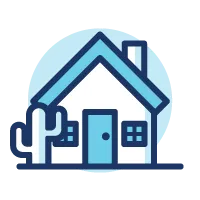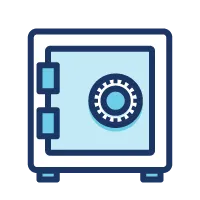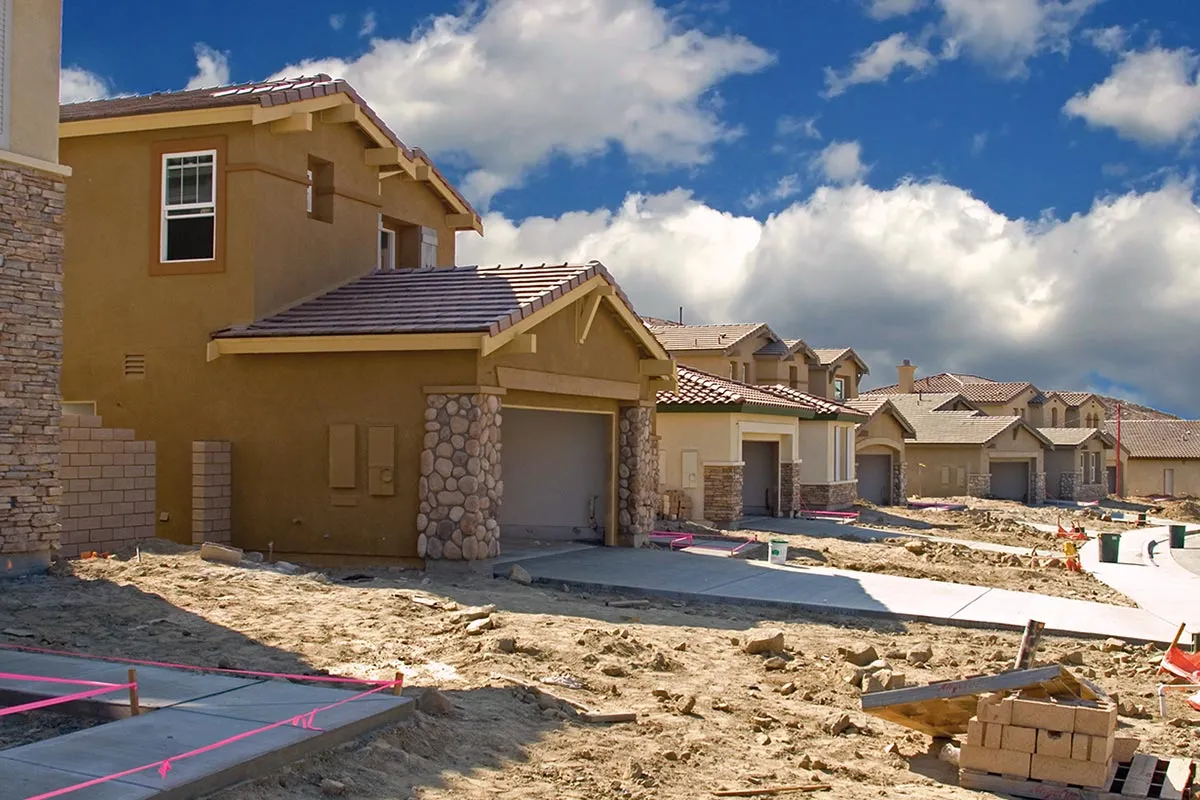Deciding whether to build a house or buy a home in Arizona may not be as easy of a decision as it once was.
With so many people leaving the higher priced areas of the United States for a more affordable life in Arizona, the housing market in Arizona has continued to skyrocket. In fact, in June 2022 the Phoenix housing market was up 21% from the previous year to a median home price of $460,000.
In addition to high competition for existing homes, supply chain issues and labor shortages have also created challenges for Arizona homebuyers leaning towards new construction as an alternative.
Taking all of this into consideration, we want to help you make the best choice when deciding whether to buy or build a house.
Which is Cheaper?
According to HomeAdvisor, the average cost to build a home in Phoenix, Arizona is $568,637. Compare that to the median sale price in Phoenix at $460,000, and at first glance it appears buying an existing home may be the cheaper way to go.
However, there are a lot more factors that need to be taken into consideration beyond just the overall sale price versus new construction costs.
Building a House vs Buying: Is Building Better?
Now that you've at least seen the average price to build a home, let's dive into both the pros and cons of building a new home. While there are a lot of great benefits when it comes to new construction, there are also some drawbacks you may not be aware of.
Pros of Building
Let's start off with all the best parts of building a new home.
Customization
When it comes to customizing your home, building a new home allows you to get exactly what you want. From the layout of your home to design elements like flooring, cabinets, lighting, fixtures, and everything else in between, you get to customize it all before you ever move in.
Less Competition
Demand since 2020 has created a competitive market for Arizona homebuyers. In fact, as of July 2022, Arizona needed to add 122,000 homes to balance the housing market. This means competition for existing homes is extreme with Arizona being one of the hottest seller's markets in the United States.
Less Maintenance
As you would expect, new homes come with less maintenance than an existing home. With a new roof, new HVAC system, and everything else brand new, the initial need for maintenance shouldn't be as much of a concern.
Healthier Home
Unlike an existing home that may have been constructed using lead-based paints or asbestos, you won't have to worry about it with a new home.
Energy Efficient
Newer homes are built with energy efficiency in mind. Unlike an older existing home, a newer home will have tightly sealed openings, higher efficiency HVAC systems, and energy efficient windows, doors and appliances.
Cons of Building
When it comes to building a new home, you may be in for more than you originally had planned on.
More Expensive Financing
When building a new home, you will need to get both a land and a construction loan. These loans are often harder to get and are more expensive than traditional loans since there is an increased risk to the lender due to the lack of collateral.
Unexpected Timeline and Costs
According to the U.S. Census Bureau, it takes an average of 8.3 months to build a house from start to finish, including the permitting process. Keep in mind, this is an average and could be slower or quicker depending on the area you're building or the contractor you're using.
When it comes to building a house, always factor in unexpected costs. These costs may include the price of materials going up during construction, unforeseen issues that are found during construction, and issues with construction delays that create extended construction loan timelines.
Stress of Building
When you build a house, there are many more decisions that will be made when compared to buying an existing home. You will need to start off by purchasing land, which may mean you’ll need a land loan. Then you'll need to hire an architect, a builder, and a designer to help you create your dream house. Tack on a construction loan and then an 8.3 month timeline, and you can already see the stress piling onto your new build decision.
The Permitting Process
When building a new home, you will likely incur extra time and costs when it comes to permits. Remember, when it comes to getting permits for your property, you are often at the mercy of how quickly (or slowly) the permit process moves.
Further Out of Town
Chances are if you're building a new home, your lot is likely further away from amenities like shopping, restaurants and the grocery store. Most lots in urban areas have already been built on, therefore choosing a lot that fits into your budget may mean building further away from where you originally planned to live. Also, empty lots tend to become much more expensive when moving closer to urban areas.
New Landscaping
New doesn't always mean better, especially when it comes to landscaping. When building a new home, plan on waiting years for your plants to mature and larger shade trees to develop enough to actually provide shade.
Building a House vs Buying: Is Buying Better?
Now that you can compare the good and bad when it comes to building a new home, what should you know about when you decide to buy an existing home?
As you will see, there are pros and cons on both sides of your real estate decision, so it's better to have all the facts before you decide to buy a house or build a house.
Pros of Buying
When deciding to buy an existing home, there are a lot of upsides to look for.
Faster Move-In Time
Ellie Mae reports the average time from making an offer to closing on a home is 50 days. Compare that to the amount of time it takes to find land, obtain construction and land loans, and then add on the average 8.3 months to build a house — all of a sudden buying an existing home feels lightning fast.
Ability to Bargain
Depending on whether you're in a buyer or seller's market will determine how much bargaining power you have. For example, when the sales of homes in your area begin to slow down, this could translate to homes staying on the market longer. This gives you, the buyer, more freedom to negotiate down the price of the home.
Closer to Urban Areas
Chances are that if you're building a new home, the area of land that is still available is on the outskirts of town. However, when buying an existing home, you have the ability to find something closer to the urban area of town.
Mature Landscaping
Are you looking for large, beautiful shade trees to sit underneath when you move in? When it comes to mature landscaping, you won't be able to check this item off of your list of wants unless you buy an older, existing home.
Less Expensive
There are few areas that you'll find to be much less expensive. For starters, traditional mortgage loans are less expensive than a land or construction loan due to the decrease in risk for the lender when it comes to an existing home already becoming an asset. Also, new construction means new everything — new appliances, light fixtures, and anything else that comes standard with an existing home purchase.
Cons of Buying
When it comes to buying an existing home, always consider the downsides before you make your decision.
Harder to Find a Home
This will vary depending on the market you're in, but in many parts of Arizona, it's harder to find a home than it ever has been before.
In recent years there have been more buyers than homes for sale, which has created a competition among multiple buyers for a single property. This increases the stress of buying a home since it may take multiple offers on different properties before your offer is accepted.
More Maintenance
Depending on how old of a home you are looking to purchase, this may translate to more maintenance. An existing home may need new HVAC units, a new roof, or other costly items in the near future.
Less Energy Efficient
It wasn't until the late 1970s that the idea of energy conservation was something most people were aware of. Fast forward to the present day and every new home is built with energy efficiency in mind.
An older home may not have as many energy-efficient appliances and may not be built with dual-pane windows or seals around doors that lower A/C and heat usage.
For the buyer, energy efficiency also translates to energy savings in the terms of how much you pay each month.
Frequently Asked Questions
Still need help deciding on which is best for you? Here are some of the top questions asked by those deciding to build or buy.
How Much Home Can I Afford?
When deciding how much house you can afford, you must first set your budget. A good rule of thumb is to keep your total mortgage payment at 25% or below your take-home pay.
This is much easier to do when buying a home when compared to building a home. As you can imagine, there are many more unexpected costs when it comes to building a home and therefore this can affect the 25% rule when the home is ready to move in and you refinance into a traditional mortgage loan.
How Do I Get a Construction Loan?
When it comes to your mortgage loan options, there are a lot to choose from when it comes to buying a home. But what about building a house?
Since most lenders don't offer land or construction loans, you will need to find the right lender that will. If you are looking into a construction loan, it's always best to use a local bank or credit union who is local and knows the area well.
OneAZ Credit Union offers construction loans for up to $3,000,000 and 80% financing.
What Type of Loan is Best for an Existing Home?
The better question to ask may be, how long do you plan on living in the home? With interest rates on the rise, many homebuyers are comparing traditional mortgage loans to ARM (adjustable-rate mortgage) loans.
While traditional fixed-rate loans are less expensive over the life of the loan, adjustable-rate mortgages offer discounted interest rates that are fixed at a lower rate for the first 5, 7, or 10 years. Then, the rate becomes variable and can go above the current mortgage interest rates.
If you're looking to purchase a home and don't think you'll be in the home once the ARM adjusts, then an ARM loan may be a great option to help you save.
Should I Buy a Home Warranty if Buying an Older Home?
According to HomeAdvisor, a home warranty will cost between $220 - $1,841 depending on the home you purchase.
This translates to a monthly breakdown of between $20 and $155 per month. With that being said, it may not be a bad decision to have a home warranty in place that first year or two when buying a home that may have a little (or a lot) of wear and tear.
Is it Better to Build or Buy a House in Arizona?
Now that you have compared the good and bad for building a house vs buying, it's up to you to make the final decision.
If this is your first home purchase, it may be a wiser financial decision to purchase an existing home instead of building a brand new house. There is a lot to learn as a new homeowner, and it's a lot easier to learn on an existing home instead of your forever home.
However, if you have been a homeowner in the past and you're ready to jump into the new construction process, then this may be the perfect time — especially here in Arizona.
Lastly, it's always great to speak with a knowledgeable mortgage lending professional to help answer any questions you may have about the process of buying or building a home.
APR = Annual Percentage Rate











